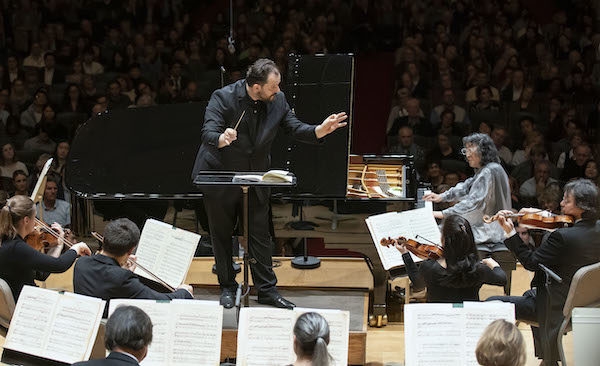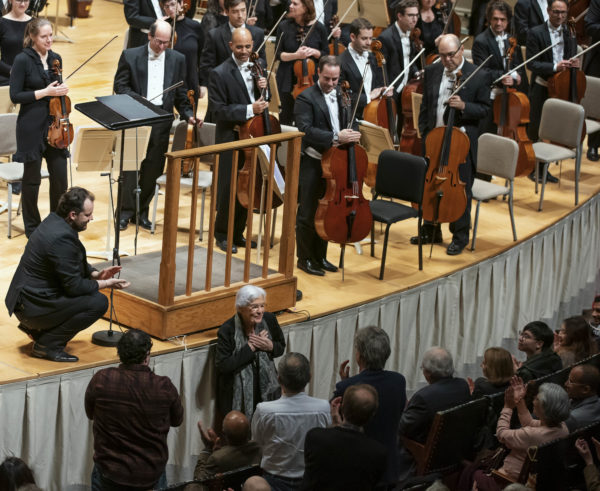Concert Review: Boston Symphony Orchestra plays Jolas, Ravel, and Shostakovich
By Jonathan Blumhofer
In the right hands, Shostakovich’s Twelfth can come off as nothing less than an intriguing, lively symphonic essay.

Boston Symphony Orchestra at Symphony Hall performing the Ravel Piano Concerto in G with conductor Andris Nelsons and pianist Mitsuko Uchida. Photo: Winslow Townson.
Every complete survey of the Shostakovich symphonies has to deal with them and, for the Boston Symphony Orchestra’s (BSO) and Andris Nelsons’s cycle, their turn has now come. “Them,” of course, are the composer’s three agitprop symphonies: nos. 2, 3, and 12. On Tuesday night, the BSO wrapped up a four-concert series featuring the Twelfth; next week they return to take on the Second and, presumably, will get a crack at the Third in 2020-21.
How’d Tuesday’s Twelfth go?
Well, let’s start out by saying that it’s not one of Shostakovich’s better symphonies. Written just after his controversial decision to join the Communist Party in 1960, the Twelfth was originally conceived as a tribute to Vladimir Lenin. In the end, though, Shostakovich opted to call it “The Year 1917.”
The score’s first movement conjures a broad overview of “Revolutionary Petrograd.” Its second, “Razliv,” is a meditation on Lenin’s pre-Revolutionary retreat in Finland. “Aurora,” the third movement, provides a dramatic depiction of the opening skirmish of the October Revolution, while the finale, “The Dawn of Humanity,” presents a bombastic vision of a socialist utopia, replete with thundering drums and blaring trumpets.
Given that program, it’s easy to see why the Twelfth hasn’t aged well – in East or West.
Musically, it hasn’t got much more going for it: Shostakovich’s thematic materials are one-dimensional and treated less to transformative developmental procedures than to simple repetition in different textural contrasts.
That said, the Twelfth is a striking example of a composer with first-rate technical and dramatic chops drawing the most out of second-tier materials. The Symphony’s dramatic trajectory is clear. Its motivic content is easy to follow. The orchestration shines. Indeed, in the right hands, the Twelfth can come off as nothing less than an intriguing, lively symphonic essay.
Tuesday’s account from Nelsons and the BSO was just that.
The orchestra’s playing in the first movement ranged from rich, broad, and dark in the pensive opening section to driven and intense during the music’s battle sequences. Its hymn-like central section provided a soothing balm.
Majestic brass playing and tenderly glowing solos from principal flute Elizabeth Rowe and principal clarinet William Hudgins were highlights in “Razliv,” as was the breathtakingly hushed (but rhythmically tight and full-bodied) string playing around its middle.
“Aurora” seethed with tension and “The Dawn of Humanity,” schlocky and contrived though its perorations may be, sang with burnished fervor.
Throughout, the BSO was conspicuously well balanced – a feat that was especially impressive given the sheer decibel levels the orchestra generated in the Twelfth’s many climactic moments. Also, Nelsons’s tempos and command of the music’s shape and pacing never felt less that natural. In a word, this was a reading that brought out the BSO music director’s considerable best.
In fact, the whole evening seemed to play to his strengths.

Boston Symphony Orchestra at Symphony Hall, part of an ovation for composer Betsy Jolas and her “Letters from Bachville.” Photo: Winslow Townson.
Opening the night was Betsy Jolas’s Letters from Bachville. A 14-minute-long curtain-raiser that imagines a journey through the streets of 18th-century Leipzig (by way of mid-20th-century Europe), Bachville offers snippets of the Great Man’s music heard against an abstracted, atonal backdrop.
The language of Jolas, now 93, is steeped in the music of much of the last half-millennium: from gestures rooted in Medieval and Renaissance polyphony to the postmodern asceticism of Anton Webern and Pierre Boulez.
Yet, at least in Bachville, her writing isn’t dry or impersonal. No, there’s plenty of character, from the mysterious, opening percussive shards to its recurring, swirling harp figurations and the theatrical final gesture (string players tapping the nut of their bows on their stands).
Indeed, Jolas’s scoring in Bachville is prismatic: constantly inventive and continuously fresh. With its splintered, start-stop form and constantly shifting moods, too, this is music that perfectly fits its subtly metamorphosing orchestration (and vice versa).
As a piece, though, Bachville proved somewhat elusive, at least on first hearing. Tuesday’s performance seemed secure enough but structurally disjunct. What’s more, Jolas’s technique of incorporating snatches of Bach – the beginning of the Brandenburg Concerto no. 3, the “Badinerie” from the B-minor Orchestral Suite, a couple bars of “Jesu, Joy of Man’s Desiring,” and so on – into a decidedly mid-20th-century musical style felt, if not exactly passé, at least a bit antiquated.
Still, the piece managed to accomplish its stated aim of evoking a dreamy scene with humor and mystery. Simply put: whether it adds up to the sum of its parts or not requires further hearings.
Regardless, Nelsons drew a reading of color and energy from the BSO, headlined by Jessica Zhou’s ravishing harp playing and a vibrant realization of Bachville’s extended percussion writing (including a short but prominent bit for lion’s roar).
Sandwiched between the Shostakovich and Jolas came Ravel’s glittering Piano Concerto in G with Mitsuko Uchida as soloist.
Uchida’s as elegant a pianist as they come, and hers was, by and large, a crystalline, finely balanced interpretation of the solo part. The songful central movement, in particular, was hauntingly played and beautifully shaped.
Nelsons and the BSO provided an accompaniment that reveled in the music’s displays of color and rhythmic bite. While the bluesy episodes in the outer movements might have benefited from a bit more soul, the whole performance was marked by such clarity of texture and character that even a little mix-up at the end – the orchestra ending a full beat before Uchida – didn’t mar the proceedings.
Jonathan Blumhofer is a composer and violist who has been active in the greater Boston area since 2004. His music has received numerous awards and been performed by various ensembles, including the American Composers Orchestra, Kiev Philharmonic, Camerata Chicago, Xanthos Ensemble, and Juventas New Music Group. Since receiving his doctorate from Boston University in 2010, Jon has taught at Clark University, Worcester Polytechnic Institute, and online for the University of Phoenix, in addition to writing music criticism for the Worcester Telegram & Gazette.
Tagged: Andris Nelsons, Betsy Jolas, Boston Symphony Orchestra, Letters from Bachville
